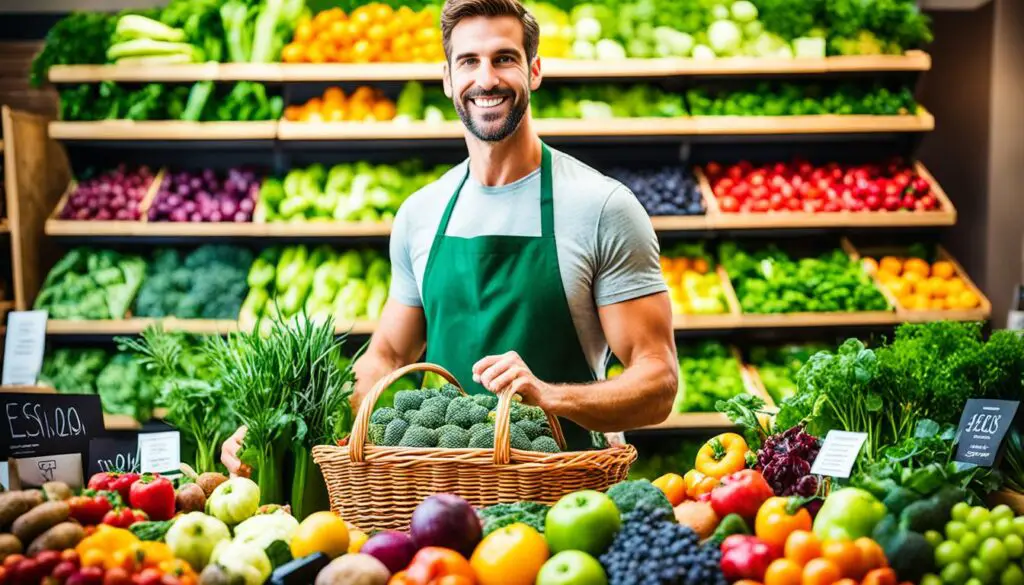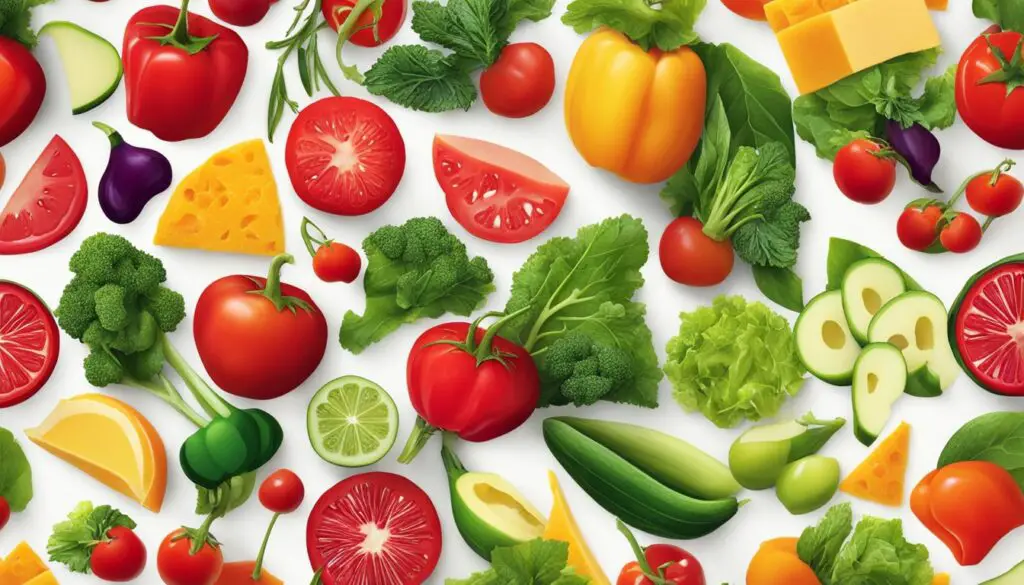Figuring out what foods are truly good for us can feel overwhelming. There’s a lot of info, and some of it is wrong. People get confused easily. I’m here to help, providing clear guidance on nutrition so you can make smart choices.
In a study of 8,000 people from the US, UK, France, and Germany, we saw a trend. More folks are paying attention to what they eat. They want to be healthy but are unsure about the best way to do it.
Many want to eat less processed food, sugar, fat, salt, and red meat. Younger people are keener on skipping red meat, dairy, and gluten. The COVID-19 outbreak changed a lot. Now, people are really into fresh foods, natural ingredients, and meals made at home.
While caring for the planet is a big deal, health comes first for most. But not that many are ready to pay extra for eco-friendly food. When picking what to eat, cost and good value are still top concerns.
Key Takeaways:
- Consumers are keen to eat better and cut back on processed items, sugar, fat, salt, and red meat.
- Younger people prefer meals without red meat, dairy, and gluten.
- The pandemic increased the desire for fresh food, natural ingredients, and homemade dishes.
- Health is more important than eco-friendliness for shoppers.
- Cost and value remain crucial when choosing foods.
Now we know more about what people want and why. Let’s look closer at eating well and helping the planet.
“Consumer Attitudes Towards Healthy and Sustainable Eating”
Today, people really care about what they eat. A big 70% want to eat better for their health. They aim to eat less processed food, sugar, fat, salt, and red meat. Instead, they look to create a balanced, nutritious diet that makes them feel good.
This effort to eat healthy is strong in France. The French are famous for their cooking. They focus on using high-quality, fresh ingredients. This shows a clear preference for foods that are good for them.
Many people also want to eat in a way that helps the planet. But, staying healthy is still on top for most. This is true for all ages. Younger folks, though, are especially eager to eat in a way that’s better for the earth. They think about the impact their food choices have on the environment.
However, people’s actions towards eating in a planet-friendly way are slow. Only 28% are choosing more sustainable foods. Even fewer, less than 30%, say they’d pay more for eco-friendly options. This shows that price is a big concern for many when choosing what to eat.
“It’s good news that people want to eat healthier and in ways that help the planet. But, we need to do more to turn this desire into real change. Educating people and making better choices easier and cheaper are key. Let’s work together to build a better food system for the coming years.” – [Expert Name]
Consumer Attitudes Towards Healthy and Sustainable Eating – Key Takeaways:
- At least 70% of survey respondents express a desire to improve their health through their food choices.
- Reducing consumption of processed foods, sugar, fat, salt, and red meat is a top priority.
- French consumers particularly emphasize the importance of fresh and wholesome foods.
- Health takes precedence over sustainability, but younger consumers show a greater interest in limiting their personal impact on climate change.
- Only about 28% of consumers reported eating more sustainable products, and less than 30% are willing to pay more for environmentally-friendly options.
This study tells us that more work is needed to help people make better food choices. It also points to a chance for food businesses to offer more options that are good for people and the planet. This way, it becomes easier for shoppers to pick the right foods.
“Flexitarianism and Plant-Based Alternatives”
Flexitarianism is about sometimes eating meat and mostly choosing plant-based foods. It’s a choice made by over half of people in several countries. These places include France, Germany, the UK, and the US.
Being a flexitarian lets me have meat occasionally. But I mostly focus on plant foods. I’ve found this helps my health and supports a more sustainable food future.
Many flexitarians aim to cut down on meat even more. They know this can be good for their health and the planet. By adding more plant foods to their meals, they get a balanced and nutritious diet.
The pandemic made a lot of people think more about their health. Around 25% started eating more plant-based foods. This shows a growing interest in choosing these options.
Choosing plant-based foods is smart for our health and the planet.
Although people enjoy the taste of meat, they’re also liking plant-based options more. Taste is a big factor when choosing foods. But, as plant products get better and people learn the benefits, they’re opening up to these options.
The Benefits of Flexitarianism and Plant-Based Alternatives
Flexitarianism brings many good things beyond just health benefits.
- Improved Health: Eating more plants can lower the risk of diseases and help with digestion.
- Sustainable Eating: Less meat means less harm to the environment, like cutting gas emissions and using less water.
- Expanded Culinary Horizons: Trying plant foods can lead to new favorite flavors and creative dishes.
A Comparison of Flexitarianism and Traditional Diets
| Flexitarian Diet | Traditional Diet | |
|---|---|---|
| Meat Consumption | Is less | Stays the same |
| Plant-Based Alternatives | Get the spotlight | Not such a focus |
| Health Benefits | Less risk for sickness | Could face more health issues |
| Sustainability | Less harm to the earth | More impact on the planet |
| Culinary Variety | Explores more flavors and ingredients | Sticks to a few options |
“Conclusion”
Many people are now into conscious eating. This means they choose foods that are good for them and for the planet. But, finding these foods is tough. It’s hard to tell which foods are really good for you and if they’re made the right way. Grocery stores don’t have many of these food choices, making it even harder.
Eating healthy outside the house is also an issue. And, healthy foods sometimes cost more. Companies selling food have a big chance to help consumers. They can put information on their products that show how healthy and green they are. By offering more good choices, they help everyone eat better, from restaurants to places that do takeout. More options that are good for us and the planet are needed.
To wrap it up, sticking to healthy and green eating plans isn’t easy. There are a lot of hurdles to jump. But, we can do it with some help. Shops and food brands need to make it easier for us. This way, we can choose what’s best for us and the world. They have a big part to play in helping us eat better and save the planet.
FAQ
Are consumers interested in eating healthier and more sustainably?
Yes, about 70% of consumers want to boost their health and eat better. They are keen on choosing healthier and more eco-friendly food options.
What are the top priorities for consumers in terms of reducing consumption?
The top goals for consumers are to cut back on processed foods, sugar, fat, salt, and red meat.
Do younger consumers have specific preferences when it comes to ingredients to avoid?
Younger people tend to steer clear of certain ingredients. These include red meat, dairy, and gluten.
How has the pandemic impacted eating patterns?
The pandemic changed how we eat. People are consuming more fresh food, avoiding artificial ingredients, and cooking at home more.
Is sustainability an important factor for consumers?
Many consumers care about sustainability, but their health comes first. So, they lean towards healthy food over eco-friendly considerations.
Are consumers willing to pay more for sustainable products?
Only some, less than 30% of consumers, are ready to shell out extra for sustainable items.
What is flexitarianism?
Flexitarianism is a diet that mainly consists of plant-based foods. Occasionally, it includes meat consumption.
How popular is flexitarianism among consumers?
Flexitarianism is quite popular, with over half of the consumers in several countries identifying as flexitarians.
Are consumers open to trying plant-based alternatives?
Yes, around 25% of people increased their consumption of plant-based foods in the pandemic. They are also open to trying such alternatives.
What are the obstacles to conscious eating?
Obstacles to conscious eating include confusion over what is truly healthy and eco-friendly. Limited product options, dining out challenges, and budget concerns are also significant.
How can retailers and food companies overcome these obstacles?
They can do this by providing easy-to-understand health and sustainability info about products. Offering a wider selection of healthy and eco-friendly goods is essential. Adding more healthy eating options in dining establishments can be beneficial too.
Source Links
- https://www.mckinsey.com/industries/consumer-packaged-goods/our-insights/hungry-and-confused-the-winding-road-to-conscious-eating
- https://www.ncbi.nlm.nih.gov/pmc/articles/PMC6982126/
- https://www.sciencedirect.com/science/article/abs/pii/S0950329313001547



